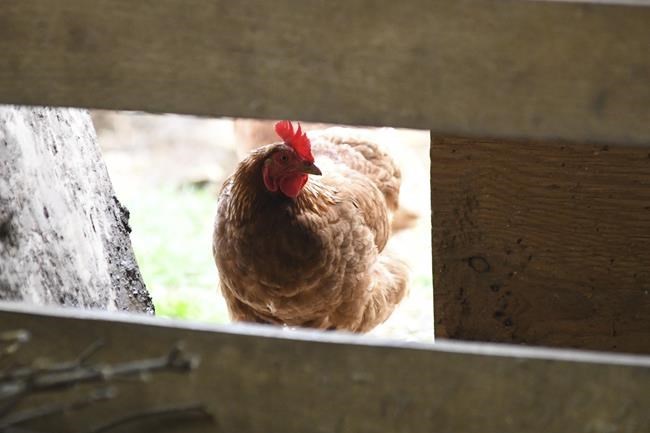
A chicken looks in the barn at Honey Brook Farm in Schuylkill Haven, Pa., on Monday, April 18, 2022. A small poultry flock in British Columbia's Kootenay region has tested positive for the avian flu, the third known outbreak in the province.THE CANADIAN PRESS/Lindsey Shuey/Republican-Herald via AP
April 29, 2022 - 2:30 PM
VICTORIA - A small poultry flock in British Columbia's Kootenay region has tested positive for the avian flu, the third known outbreak in the province.
A statement from B.C.'s Agriculture Ministry says the flock has the highly infectious H5N1 virus and has been placed under quarantine by the Canadian Food Inspection Agency.
It says the ministry is working closely with the inspection agency and poultry producers to ensure enhanced prevention and preparedness measures are in place.
The ministry says seven wild birds that died between April 20 and 27 have also tested positive for H5 strains of the highly infectious illness.
They include three snow geese and one Canada goose in the Vanderhoof area, and bald eagles near 100 Mile House, Bowen Island and Vancouver.
The avian flu is sweeping across North America, and B.C. confirmed its first case on a farm in the North Okanagan earlier this month, followed by an outbreak in a small backyard poultry flock in Kelowna earlier this week.
Avian flu cases have been confirmed in several other provinces, but no infections have been detected in humans.
The inspection agency has said the illness is not considered a significant concern for healthy people who are not in regular contact with infected birds.
The agency said it expects there will be more cases as wild birds continue to migrate north for the summer.
B.C. has ordered all commercial poultry operators with more than 100 birds to move their flocks indoors until the spring migration ends in May.
Those with small flocks are urged to watch for signs of illness in their birds, eliminate the chance for contact with wild birds and step up the disinfection of all clothing and equipment used when caring for their animals.
This report by The Canadian Press was first published April 29, 2022.
News from © The Canadian Press, 2022